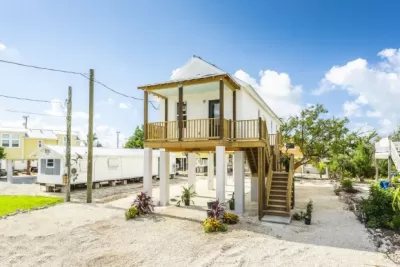A New York Times article explains and, potentially, introduces the community land trust concept, which has proven immensely capable of preventing displacement and foreclosures while advancing homeownership and racial equity.

Michael Friedrich writes about community land trusts as a corrective for skyrocketing housing costs and the displacement of families of color. "By removing land from the speculative market, [community land trusts] keep housing affordable for first-time homeowners — especially low-income people of color," according to Friedrich.
Friedrich exemplifies the potential of land trusts as an avenue to homeownership by examining the Atlanta Land Trust, founded in 2009 during the development of Atlanta BeltLine. "The Atlanta Land Trust focuses on low-income buyers who make between 60 percent and 80 percent of the local median income and can readily support a traditional mortgage," according to Friedrich. "So far, the organization has sold 15 land trust homes; it aims to build 300 by 2025."
According to Friedrich, community land trusts are rooted in the cause of racial equity. "Unlike other types of land trusts, like those formed to conserve land by restricting development, they were devised specifically to prevent the displacement of communities of color," writes Friedrich. In addition to providing a tool for racial equity, community land trusts have been show to lower foreclosure rates and prevent displacement, according to research cited in the article.
The article also describes the scope of the community land trust movement, which can be found in gentrifying neighborhoods around the country in numerous other cities besides Atlanta. The Grounded Solutions Network, for instance, has created a three-city cohort comprising Atlanta, Houston and Portland, Ore. That "shares strategies for acquiring vacant and abandoned land in an effort to scale up the land trust model."
"Encouraged by research on the benefits of community land trusts, Grounded Solutions aims to support the creation of one million new units across the country over the next 10 years," reports Friedrich.
FULL STORY: Affordable Housing Forever

Alabama: Trump Terminates Settlements for Black Communities Harmed By Raw Sewage
Trump deemed the landmark civil rights agreement “illegal DEI and environmental justice policy.”

Study: Maui’s Plan to Convert Vacation Rentals to Long-Term Housing Could Cause Nearly $1 Billion Economic Loss
The plan would reduce visitor accommodation by 25% resulting in 1,900 jobs lost.

Planetizen Federal Action Tracker
A weekly monitor of how Trump’s orders and actions are impacting planners and planning in America.

Wind Energy on the Rise Despite Federal Policy Reversal
The Trump administration is revoking federal support for renewable energy, but demand for new projects continues unabated.

Passengers Flock to Caltrain After Electrification
The new electric trains are running faster and more reliably, leading to strong ridership growth on the Bay Area rail system.

Texas Churches Rally Behind ‘Yes in God’s Back Yard’ Legislation
Religious leaders want the state to reduce zoning regulations to streamline leasing church-owned land to housing developers.
Urban Design for Planners 1: Software Tools
This six-course series explores essential urban design concepts using open source software and equips planners with the tools they need to participate fully in the urban design process.
Planning for Universal Design
Learn the tools for implementing Universal Design in planning regulations.
Caltrans
Smith Gee Studio
Institute for Housing and Urban Development Studies (IHS)
City of Grandview
Harvard GSD Executive Education
Toledo-Lucas County Plan Commissions
Salt Lake City
NYU Wagner Graduate School of Public Service





























